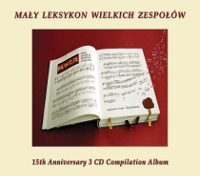 British singer-songwriter Peter Hammill is a household name amongst many a fan of progressive rock music primarily due to being the founding member and the driving force behind Van Der Graaf Generator, a band for good written into the 70s’ progressive roster of fame. However, the English singer-songwriter has also attained wide acclaim because of his numerous solo releases spanning a career of more than forty years. Despite these enticing facts, I’ve never gone beyond knowing the man’s name. Until now, that is.
British singer-songwriter Peter Hammill is a household name amongst many a fan of progressive rock music primarily due to being the founding member and the driving force behind Van Der Graaf Generator, a band for good written into the 70s’ progressive roster of fame. However, the English singer-songwriter has also attained wide acclaim because of his numerous solo releases spanning a career of more than forty years. Despite these enticing facts, I’ve never gone beyond knowing the man’s name. Until now, that is.
I’m starting my Hammill journey from 1977’s “Over” simply because it was favorably opined about by the much respected No-Man’s Tim Bowness in a recent blog. The available album information yields that this release featured the Van Der Graaf line-up on the instruments and is Hammill’s perhaps most personal effort, dealing with the theme of a break-up with the beloved woman.
The first track, “Crying Wolf”, does not sound too glum to me, instead bits of self-deprecation spill through what otherwise is perceived as an energetic rock opener. I’m really struck with the lyrics that I read on as I’m listening to the album. The woodwind ending is a nice finish to the song.
The next piece, “Autumn”, kicks off in a much more languid, even depressive way. The violins effectively emphasize the sense of loss, when “children have grown up and moved away”. There’s the generations gap issue present (“I don’t understand their ways”) as well as the break-up of family ties (“we used to have a family”) there.
“Time Heals”. For me it is 8 minutes and 43 seconds of a self-confessing reverie harking back to the time when “our steps entwined”, when “you are his and I am yours”. Truly, no more disquieting situation is imaginable for a man in love. The tempo slows down and speeds up time and again, in the ebb-and-flow manner, reflecting thereby the moody anguish that clasps, then lets go for a while, only to sear again. The distraught “if you leave me now, it might nearly kill me…” leaves no crux as to what is being sung about. The composition ends as it begins , with a slow piano part, Hammill’s vocals strongly reminiscent of Roy Harper’s (at least to me). There is something a-la Roger Waters in how Hammill delivers the lyrics, half-whispering, half-speaking them at the beginning and the end of the song, the words worming through through the listener. It’s well-nigh a stream of consciousness, put to music.
“Alice” (“Letting Go”). Another quiet acoustic start and an injection of moodiness and ruin. A simple melody winding around the lyrics, which really make most of this song and are central to understanding it.
It feels like this piece is well-nigh spoken words of a split-up reverie addressing the once-beloved ex, Alice.
The song seems interim and designed to further uphold the mood of the album, though story-wise it’s a thing on its own. Nearly set me dozing, to be honest.
“This Side of the Looking-Glass”. A definitive favourite of mine from the very first spin. The strings married to the brooding harmonic vocals are like bobbing waves, tenderness of loss permeating through them.
He’s yearning, lost, burning, desolate and is rooted in the past with no-one by to comfort him. At minute 5 the strings reach a frail crescendo, then falter to rise again as if the individual has finally turned towards the light, but, alas, “I’m hoping for a miracle, but I’m finding no sign”.
“Betrayed”. Another slow-paced acoustic number of half-spoken crooning, pitching to an shouted anger, with the strings adding to it a hue of express the pain of a split relationship.
“(On Tuesday She Used To Do) Yoga”. From the lyrics we glean that he wasn’t so ideal after all, “I was the prince of pride”. But then it was “too late now to say that I’m so sorry”.
“Lost and Found”. Despite being lost in the vertigo of memories from his so hurting past, the man is intent now on “holding his piece forever” and he’ll be “waiting for the princess”. Free at last, in love at last (with the reverie or an imagined ideal to substitute the former?), he’s lost and found. And the song ends with the question if everything’s gonna be all right. Still unsure…
I shall conclude by saying it’s probably the most musically interesting song on the otherwise pretty much lyric-centred album, the diverse tempos and a Van Der Graaf Generator quote give it some life.
This is not the kind of music you order to be played at your wedding. This is not the sort of musician to exhilarate you to the seventh heaven and leave you floating up there dreaming of happy love. This is a personal record. A record as much as a divorce hearing statement from a broken husband (now ex). This is as much a reverie of the yoga sessions never to return as of the children grown up and lost to their father.
To cut a long story short, “Over” is a great album to play when all’s…over.







